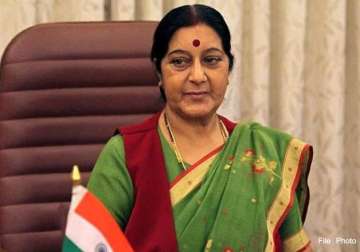Keeping up connect with Arab world, Sushma Swaraj to visit Egypt
New Delhi: India is readying for a major foray into the Arab world as part of its 'Link West' policy. After Prime Minister Narendra Modi's visit to the United Arab Emirates in his maiden visit
New Delhi: India is readying for a major foray into the Arab world as part of its 'Link West' policy. After Prime Minister Narendra Modi's visit to the United Arab Emirates in his maiden visit to the Arab world, External Affairs Minister Sushma Swaraj will go to Egypt on August 23.
Thereafter, she will proceed to Germany.
Terrorism and trade are likely to be top on the agenda of Sushma's talks in Egypt as President Abdul Fattah al-Sisi has approved stringent new counter-terrorism laws to fight growing jihadist insurgency in his country.
Jihadist groups have stepped up attacks in Egypt after the overthrow of then president Mohammed Morsi two years ago, and the government has launched a crackdown on the Muslim Brotherhood.
Egypt is also taking ambitious steps towards boosting its economy. Sisi earlier this month inaugurated $8 billion New Suez Canal, a waterway running parallel to a part of the 19th century Suez Canal connecting the Mediterranean and the Red Sea - the shortest shipping route between Europe and Asia.
A 460 sq km economic zone is also being set up around the New Suez Canal which will be used to develop an international industrial and logistics hub to attract foreign investment.
Egypt is keen that India invest in the New Suez Canal industrial economic zone.
In the UAE, Prime Minister Modi has made a pitch for attracting big time investment to India and for boosting trade.
Addressing an investors meet in Masdar City, Modi on Monday wooed top UAE businesses, saying India had a potential of $1 trillion investment and also promised to address the concerns of business persons.
On Sunday night, he held talks with the leadership of the Abu Dhabi Investment Authority (ADIA), the $800 billion sovereign wealth fund said to be the world`s second largest.
Modi, who is visiting the UAE 34 years after the last prime ministerial visit by Indira Gandhi, was received by Crown Prince Sheikh Mohamed bin Zayed Al Nahyan at the airport and accorded a ceremonial welcome.
In a significant gesture, the five brothers of the Crown Prince were also present at the Abu Dhabi Presidential Airport to receive Modi on Sunday.
Modi also visited the Sheikh Zayed Grand Mosque, the biggest mosque in Abu Dhabi.
He wrote in the visitor's book: "I am confident that it will be a symbol of peace, piety, harmony and inclusiveness that are inherent to the faith of Islam."
After Modi landed in Abu Dhabi, the UAE decided to allot land for building a temple in Abu Dhabi for the Indian community, fulfilling a longstanding demand of the community which numbers 2.6 million.
Last week, Iranian Foreign Minister Javad Zarif was in the capital to brief the Indian government on the nuclear deal.
Zarif met Modi, Sushma and Transport Minister Nitin Gadkari to give a forward push to the Chahbahar port agreement. Modi had met Iranian Prime Minister Hassan Rouhani on the sidelines of the Shanghai Cooperation Organisation summit in Ufa, Russia, last month.
Sushma has been keeping up India's engagement with the Middle East. She visited the UAE last November, Bahrain in September and Oman in February this year. She is also slated to visit Jordan, Palestine and Israel later this year.
Prime Minister Narendra Modi is likely to visit Saudi Arabia later this year.
The Emir of Qatar was in India in March this year, while the foreign affairs minister of Oman visited in June last year, within days of the new government taking over.
India's talks on terrorism with the leadership in the Arab world comes even as two Indians kidnapped early this month in Libya remain in captivity of the Islamic State. The two were part of four Indian professors kidnapped in Sirte in Libya. While two have been released, two continue to be in captivity.
Thirty-nine Indians kidnapped in June last year in Mosul, Iraq, by the Islamic State, are still in captivity. The government insists the men are still alive.
The UAE and Egypt are concerned over Islamist militancy creeping into their respective countries. While Egypt has cracked down with a heavy hand on the Islamist party, Muslim Brotherhood, in an effort to keep the secular fabric alive in the country, the UAE has also taken stringent steps against suspected terrorists.
